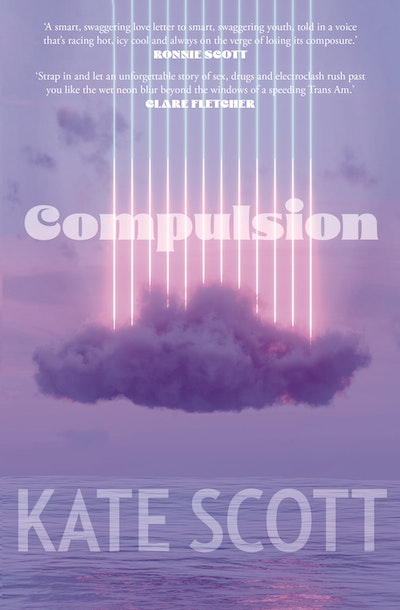We talked to Kate Scott, author of Compulsion, to learn about her writing routine (or lack thereof), advice she’d give her past self and the source of her inspiration.
What was your writing process for Compulsion? Did you have a writing routine or any regular rituals?
The emotional bones of the book came together at my grandfather’s house in Caves Beach, where I’d take morning walks along the ocean and afternoon walks through the national park listening to music, hatching dialogue and feelings, then write at his dining table. Utopia. But the real work, the grunt of redrafting and editing, was done in full goblin-mode at home: 10-hour stretches in pyjamas, inhaling sleeves of crackers, half-glasses of water everywhere, letting the rest of my life burn down, etc. I take notes on my phone constantly, but I’m not a routine person and definitely not a write-every-day person: it’s either all-in or all-out.
How did you first come up with the idea for the book?
I started writing scraps when I was editing street press in the early 2000s. It was originally envisaged as an adult 'choose your own adventure' style book of one bacchanalian night – and all the ways it might explode. It took three stern/smart readers to coax me out of that structure (too gimmicky, too constrained), but the stubborn part of me might return to the form one day.
What was your big break into publishing?
I interned at a music magazine when I was 18, doing all the things no one else wanted to do (transcriptions, reviewing Britney’s ‘One More Time’) and basically camped at the office for the next three years, earning enough to pay the $5 cover charge for Super Deluxe on Saturday nights, my train fare to uni, and the occasional blowout on iridescent platform sneakers.
How long have you been working on this book?
Twenty years – eek! – but three years with real intent.
What was the publishing process like (finding an agent, submitting manuscripts, etc.)?
Terrifying, but a very generous friend recommended an agent, and everything got much easier. Having someone read the manuscript through the lens of potential publication gave it a gleam of materiality, something I could legitimately crash-tackle with full force from then on. Not everyone needs permission to do this, but I did. My agent also made excellent suggestions on the first draft, which turned it from a fever dream into something resembling a book.
What most excites you about your book being published in 2023?
There was a panel called ‘What If My Mum Reads This?’ at Sydney Writer’s Festival in 2022, featuring Alana Hicks, Cat Yen, Jackie Bailey, Sarah Malik and Benjamin Law. It was a very raw, very real dialogue between writers and audiences that felt different to sessions of even two years ago: genuine conversation rather than the performance of questions and answers. I’m 1000% here for this vibe shift. (Also exciting: the idea that someone, somewhere, might have the intensity of feeling about Compulsion I have about music and books.)
Do you have a favourite book or author?
Impossible! But I read – and reread – everything Jia Tolentino, Carmen Maria Machado, Patricia Lockwood, Joan Acocella and Sarah Marshall publish (the last three years have been an extended essay and autofiction bender).
What inspired you to become a writer?
Being a reader.
What did you want to be when you grew up and why?
A psychologist, a photographer, an herb farmer, a pianist – analytical, creative and ultimately frustrated impulses that all feed my writing. What I ended up being was an editor/marketer/strategist, dark arts that have been enormously helpful in writing and publishing a book.
If you could go back in time and give your past self one piece of advice, what would it be and why?
Keep doing your weird thing, and if you’re going to get distracted, make those distractions meaningful.
What is the best writing lesson/ tip you ever received?
These weren’t personally intended for me, of course, but:
‘Fill every beat with something.' – Brian Eno
‘Chop up that failure and use it for bait to try to catch another project.’ – Elizabeth Gilbert
‘There is no theory. You merely have to listen. Pleasure is the law.’ – Claude Debussy













